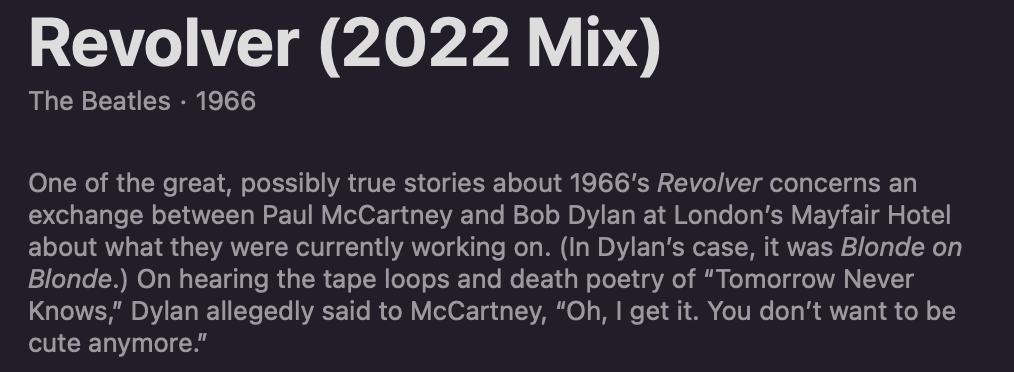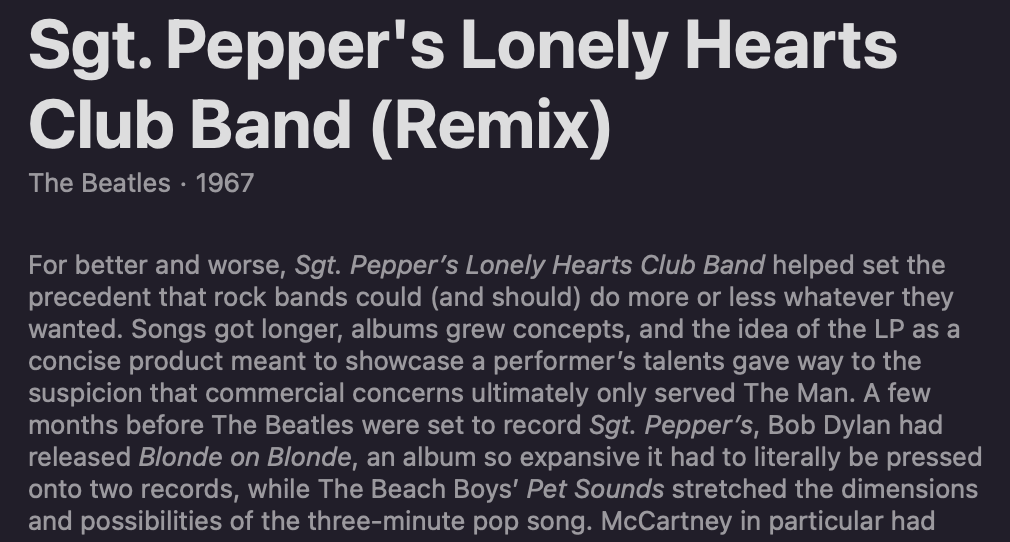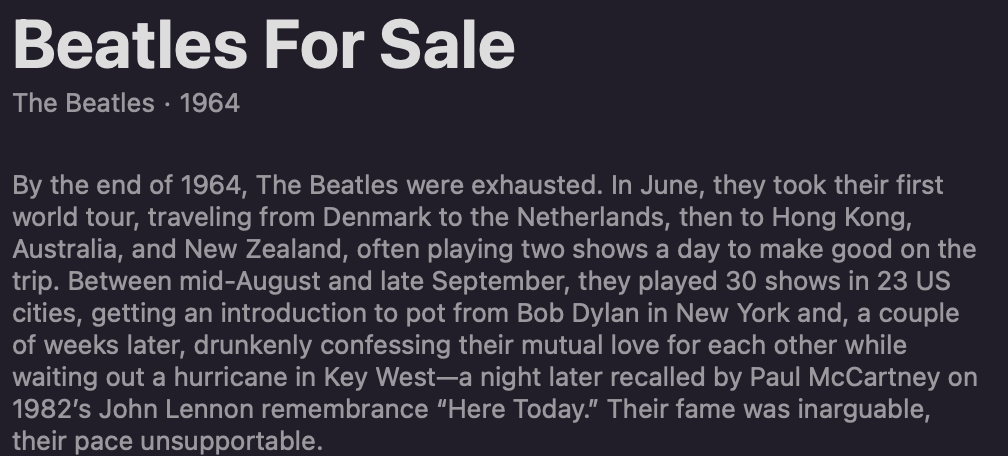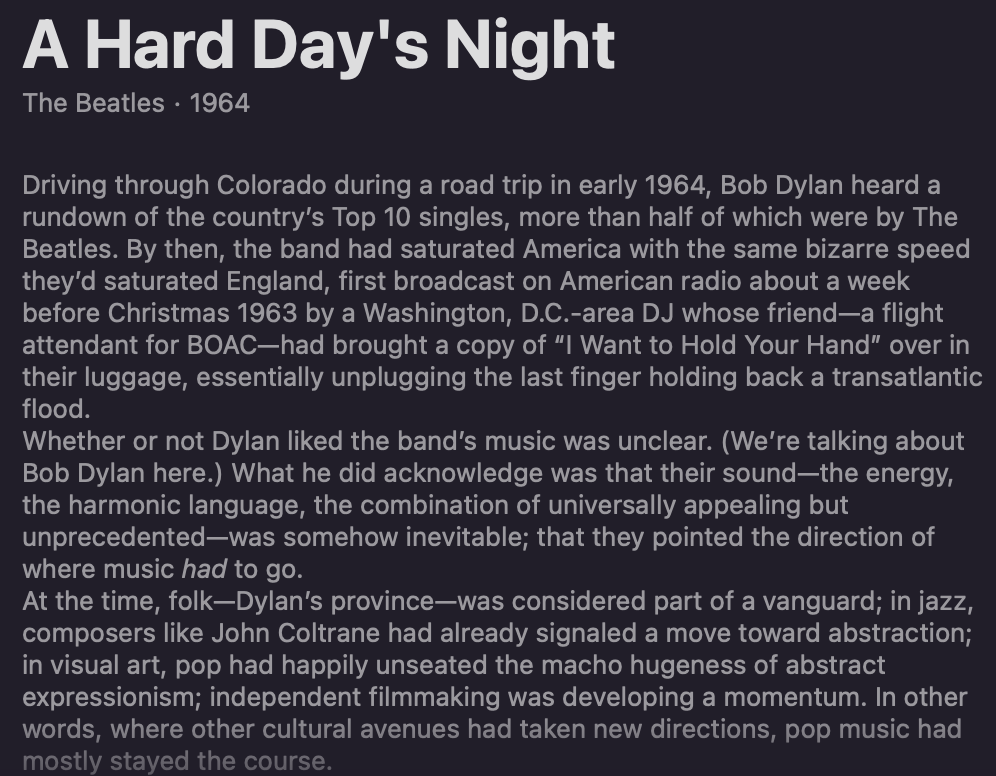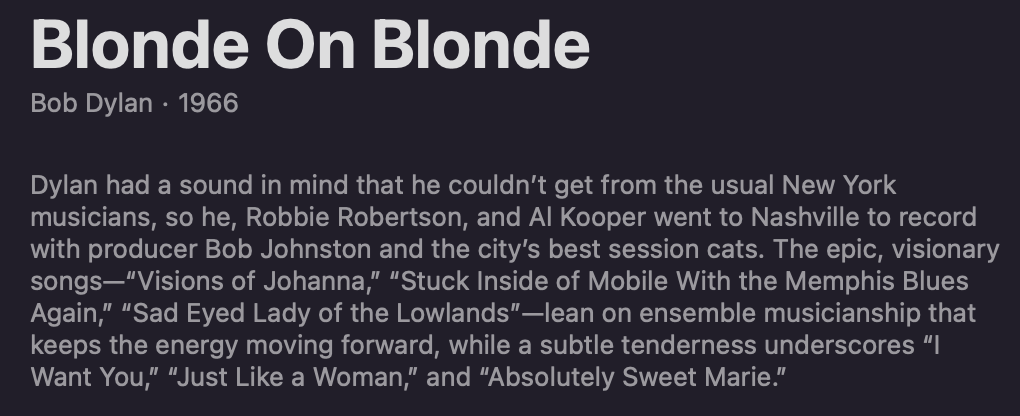Apple Music vs(?) The Beatles
Thanks to the “new” song, the Beatles have made there way back into regular rotation around Icecano Headquarters. Back during iTunes’ “Rip. Mix. Burn.” period I had a carefully curated set of MP3s I ripped from CD and painfully filled in all the ID3 tags. (For context, this was just after the last elf had sailed over the sea).
I used to use this as a way to describe both my first iPod and first iPhone—“Look! You can fit every Beatles song on here!!” Somewhere along the line, those MP3s got replaced with the iTunes Match upgraded versions.
But that was all few iPhones back; these days I’m mostly an Apple Music user (while those old MP3s sit on my post-Ragnarok Drobo.)
Overall, I like Apple Music a lot. Sure, vendor ecosystem lock-in and all, but the music sounds great, doesn’t cost too much for the family plan, and it works with all of my gear.
As I recall, it was kind of a big deal when the Beatles finally made it into Apple Music—they were one of the last holdouts, and Apple made quite a splash when it finally happened. And you can tell! All albums have slightly animated cover art—the lines on Magical Mystery Tour alternate colors, the line art caricatures of the four of them on Revolver blink and look side to side. Apple also has the new(er) remixes and remasters in addition to the original flavors, the new edits, especially Abbey Road, sound great; sounds like it could have been recorded last week instead of 50-plus years ago. (There’s a few songs here and there that don’t sound quite like I remember them, but sure.)
Which all brings me to the point: one of the other things I like Apple Apple Music the editorial stuff: curated playlists, recommendations, editorial notes. (I think in general the music editorial stuff is better than its counterparts in say, the app stores.). So, having not really poked around in the Beatles catalog in Apple Music, I was curious about what the anonymous apple music editors would have to say about the Beatles’ albums. What even new was there to say that hadn’t already been said? But, given how much attention they drew to the Beatles arriving on the service, they must have made the effort to do something.
Faced with this challenge, Apple found an absolutely innovative, if deranged, solution: hire someone who doesn’t really like the Beatles, but loves Bob Dylan.
I know, you think I am exaggerating. So, for example, check out the start of the description of Revolver, which might be their best album:
That’s… an absolutely insane way to start. Why is Bob Dylan’s probably-apocryphal backhanded compliment the lede of the description of Revolver?
(For the record, these are only excerpts, the full descriptions go on and on and on. Apple Music subscribers can verify read the rest as an exercise for the reader, for everyone else, you aren not missing much.)
Okay, maybe that’s a weird outlier, trying to start with a joke and landing badly. Let’s check in on their next album, Sgt. Pepper, one of the greatest albums of all time. Whole books have been written about this, where does that start?
Okay, so, that’s a not a paragraph written by someone that likes this album, or even recognizes it has any value. That sounds like Martin Scorcese slagging off on another Marvel movie. But most importantly, why is Bob Dylan here again? By my count, that two sentences of non-praise for the album under discussion, and then unreserved praise for Blonde on Blonde , which the author wants to make sure we all know came first. What is happening?
We stagger backwards through the catalog, and find that Bob Dyan makes another cameo appearance in Beatles for Sale:
Are we really claiming that one of the most interesting things about their 4th album (and 4th in two years) is that… Bob Dylan… smoked them out in New York City?
But the most amazing appearance by Bob is on A Hard Days Night. Recall: huge hit, came hand-in-hand with the hugely innovative and successful movie. There’s so much to talk about here! Richard Lester, the birth of the music video, continued success and innovation. That chord! But, no, what’s really important is Bob Dylan:
What in the literal hell is this? Three whole paragraphs centered around the fact that Bob Dylan once heard the Beatles on the radio?
Is… is the author of these really trying to claim that the source of the Beatles’ legitimacy is that Bob Dylan knew who they were? Look, Bob Dylan is great and all, but there is no reality where Bob Dylan’s option has any bearing on the legitimacy of a Beatles album. (The other way around, maybe.)
That’s four out of thirteen albums that have an unexpected cameo appearance by Bob. That’s absolutely bonkers. How did this make it out of the door?
While Bob doesn’t make any more appearances, the other album descriptions are equally pathological. Check out their first album, which hit the top of the charts, stayed their for six months, and then was only knocked down by their second album:
Let’s recap, shall we? Apple Music, which is owned by Apple Inc, founded by such a massive Beatles fan that he named his company after the Beatles’ own Apple Corps company; that Apple Music wants you to know that the Beatles were basically idiots who got lucky and whom Bob Dylan smoked out and was rude about.
What? What?
I assume I’m late to this party, but how did this happen? I get that there is literally no one on earth who needs “more praise” less than the Beatles, but why on earth is this what they went with?
How does this person’s editor not stop and say, “look, maybe dial back the Bob Dylan references a tad.” Even worse, maybe they did, and that’s why Bob only get mentions on four instead of all thirteen.
But then I got curious. Dylan’s Blonde on Blonde gets mentioned by name twice—how does Apple Music describe that album?
Unlike the endless editorials on the Beatles Albums, Blonde on Blonde has a single crisp paragraph:
Delicious.
The person who wrote the Beatles album liners was jealous they didn’t get to do Dylan, got it.
